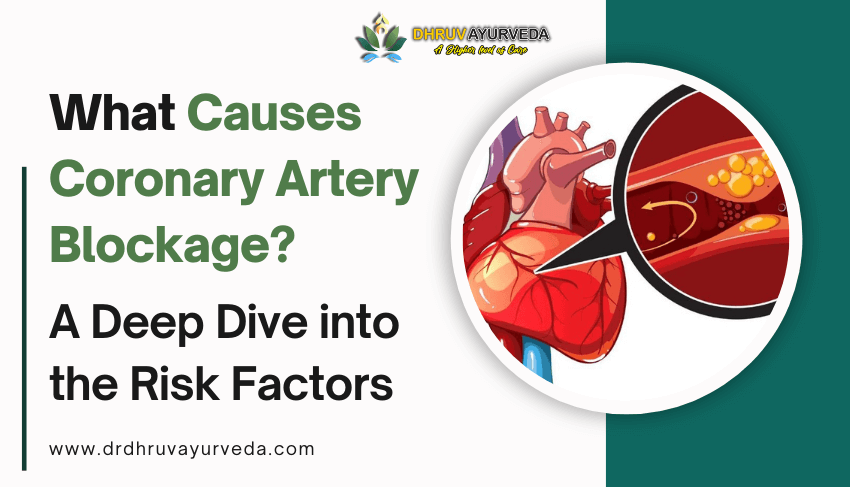Coronary artery blockage, also known as coronary artery disease (CAD), is one of the leading causes of heart attacks and cardiovascular complications worldwide. This condition occurs when the blood vessels supplying the heart become narrowed or blocked due to plaque buildup. Understanding the risk factors behind coronary artery blockage is essential for preventing and managing this life-threatening disease. In this article, we will explore the primary causes and contributing factors that lead to the narrowing of coronary arteries.
Understanding Coronary Artery Blockage
The coronary arteries play a crucial role in supplying oxygen-rich blood to the heart. When these arteries become narrowed due to plaque buildup, blood flow is restricted, leading to potential heart complications such as angina (chest pain) or a heart attack. This blockage is primarily caused by a condition called atherosclerosis, which involves the accumulation of fatty deposits (plaques) inside the arteries.
Major Risk Factors for Coronary Artery Blockage
1. High Cholesterol Levels
One of the leading causes of plaque formation in the arteries is high cholesterol. Low-density lipoprotein (LDL) cholesterol, often referred to as “bad cholesterol,” contributes to plaque buildup, while high-density lipoprotein (HDL) cholesterol, known as “good cholesterol,” helps remove excess cholesterol from the bloodstream. A diet rich in saturated fats and trans fats can elevate LDL cholesterol levels, increasing the risk of coronary artery blockage.
2. Hypertension (High Blood Pressure)
High blood pressure exerts excessive force on the arterial walls, making them more susceptible to damage and plaque accumulation. Over time, this can lead to the hardening and narrowing of the arteries, increasing the risk of coronary artery disease and heart attacks.
3. Smoking and Tobacco Use
Smoking is a significant risk factor for coronary artery blockage. The harmful chemicals in tobacco smoke damage the lining of the arteries, leading to inflammation and plaque formation. Nicotine also raises blood pressure and reduces oxygen levels in the blood, further increasing cardiovascular risk.
4. Diabetes and Insulin Resistance
People with diabetes are at a higher risk of developing coronary artery disease due to high blood sugar levels that can damage blood vessels. Insulin resistance, a condition common in type 2 diabetes, also promotes inflammation and plaque buildup in the arteries.
5. Obesity and Sedentary Lifestyle
Excess body weight, especially around the abdomen, is associated with high cholesterol, high blood pressure, and diabetes, all of which contribute to coronary artery blockage. A sedentary lifestyle with minimal physical activity further exacerbates these risks by promoting weight gain and poor cardiovascular health.
6. Unhealthy Diet
A diet high in processed foods, refined sugars, unhealthy fats, and excessive sodium increases the risk of developing atherosclerosis. Consuming a balanced diet rich in fruits, vegetables, whole grains, and lean proteins can help prevent plaque buildup and maintain healthy arteries.
7. Chronic Stress and Mental Health Issues
Long-term stress, anxiety, and depression can negatively impact heart health. Chronic stress leads to the release of stress hormones like cortisol and adrenaline, which can raise blood pressure, increase inflammation, and promote unhealthy lifestyle habits such as overeating, smoking, or alcohol consumption.
8. Genetics and Family History
A family history of coronary artery disease increases the likelihood of developing the condition. Genetic factors influence cholesterol levels, blood pressure, and the likelihood of atherosclerosis. Individuals with a family history of heart disease should be extra cautious about their lifestyle choices.
9. Age and Gender
The risk of coronary artery blockage increases with age as the arteries naturally lose their elasticity and become more prone to damage. Men are generally at a higher risk of developing coronary artery disease earlier in life compared to women. However, after menopause, women’s risk significantly increases due to decreased estrogen levels.
10. Excessive Alcohol Consumption
While moderate alcohol consumption may have some heart benefits, excessive drinking can lead to high blood pressure, obesity, and increased cholesterol levels. Heavy alcohol consumption also contributes to an irregular heartbeat (arrhythmia), which can increase the risk of heart attacks.
Preventing Coronary Artery Blockage
Preventing coronary artery blockage requires a combination of lifestyle changes and medical interventions. Here are some effective strategies:
- Adopt a Heart-Healthy Diet: Focus on consuming foods rich in fiber, healthy fats, and antioxidants while avoiding processed foods and trans fats.
- Regular Exercise: Engage in at least 30 minutes of moderate-intensity exercise, such as walking, jogging, or swimming, five times a week.
- Manage Stress: Practice relaxation techniques like meditation, deep breathing, or yoga to reduce stress levels.
- Quit Smoking: Seek support from smoking cessation programs to eliminate tobacco use.
- Monitor Blood Pressure and Cholesterol Levels: Regular health check-ups help in early detection and management of risk factors.
- Maintain a Healthy Weight: Achieve and sustain a healthy BMI through a balanced diet and physical activity.
- Limit Alcohol Consumption: Drink in moderation or avoid alcohol altogether to reduce heart disease risk.
Conclusion
Coronary artery blockage is a severe cardiovascular condition that develops over time due to various risk factors, including high cholesterol, hypertension, smoking, diabetes, and an unhealthy lifestyle. While some risk factors like age and genetics cannot be controlled, many lifestyle-related factors can be managed to reduce the likelihood of developing coronary artery disease. By adopting heart-healthy habits and seeking medical guidance when necessary, individuals can protect their heart health and lower their risk of life-threatening heart conditions.
Prioritizing a proactive approach to cardiovascular health can make a significant difference in maintaining a strong and healthy heart for years to come.
Contact Dr. Dhruv Ayurvda for Coronary Artery Blockage Treatment..+91-7376202002
